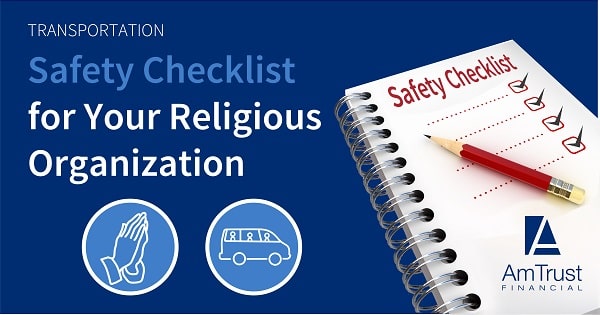In today’s world, safety is of utmost importance in religious organizations. Assuring the security of the congregation, whether during church services, social activities or offsite events is something that should always be kept top of mind. In AmTrust’s upcoming series on common religious organization hazards, we take a proactive approach to promoting a safe environment in your faith-based establishment.
When it comes to transporting members of the congregation, whether it’s driving a youth group to camp or senior citizens to and from a senior living community, ensuring your organization has a safety policy for passenger transport vehicles can also help increase the feeling of security.
Transportation Safety Checklist

Use the checklist below when implementing passenger transport vehicle safety procedures at your religious organization:
Consider the Type of Vehicle Utilized
Regarding the type of vehicle your organization uses, consideration should be given to eliminating the use of 15-passenger vans altogether. This is due to the fact that these types of vans pose an increased risk under certain conditions, as they have suspensions that raise them high above the road and increase the risk of roll-over accidents. Additionally, equip vans with proper safety equipment like dual rear wheels and stability control systems.
Proper Use and Storage of Passenger Transport Vehicles
A policy should be set regarding the type of vehicles used and who is allowed to drive them. If employees or volunteers are using their own personal vehicles to transport members of the congregation for specific religious duties, they should have adequate insurance coverage with reasonable limits. If your organization owns its own vehicles, they should be stored in designated secure locations overnight, like a locked garage or gated area with security cameras in place.
Perform Background Checks on Drivers
All drivers should be pre-selected and screened before they are allowed to transport people from any location.
Motor Vehicle Records (MVRs) should be obtained initially on the hire date and then again on an annual basis for all employees or volunteers who drive on behalf of your religious organization.
Create Policies
Your organization should create and implement the following policies regarding transportation safety:
- Seat belts: Don’t rely solely on the laws of your specific state to provide the critical protection drivers need behind the wheel. Implement a formal seat belt policy that requires all occupants of the vehicle to wear a seat belt at all times, and enforce disciplinary action when this policy is not followed.
- Cell phones: The Federal Motor Carrier Safety Administration has implemented a strict cell phone policy, prohibiting the use of cell phones at all times when employees or volunteers are operating a vehicle. In the event of an emergency or should a driver be required to make or receive a call, drivers should pull over to a safe location before using a device.
- GPS: Determine the type of navigation system approved to use – only specific types should be allowed. Ensure these approved GPS systems can be used safely and do not impair or distract the driver (i.e. mounting systems).
- Maximum radius: Determine the maximum territorial radius vehicles for your religious organization may be driven. A person should be appointed to be in charge of approving or denying trips that go outside this maximum radius on a routine basis.
Provide Driver Training
If possible, drivers should be encouraged to attend a training class that allows for hands-on experience before they get behind the wheel. At the very least, employees and volunteers should understand the basics of defensive driving techniques, such as adhering to posted speed limits, maintaining a 3-second following distance, keeping eyes on the road and always being prepared to react safely in any type of situation, inclement
weather conditions included. AmTrust policyholders have access to a variety of
safety training videos, which include safe driving tactics.
Complete Regular Vehicle Inspection, Maintenance and Repair
Before transporting passengers, drivers must complete a pre-trip inspection on the vehicle, checking the tires, brakes and lights. All vehicles used for religious organizations should be inspected on a regular, ongoing basis, with proof of inspection and road worthiness from a certified mechanic on file prior to operating the vehicle. Additionally, depending on the use, a certain frequency of
vehicle maintenance inspections should be established to ensure safety for all passengers.
Ensure Accidents Are Reported in a Timely Manner
Your drivers should understand the importance of reporting any and all accidents in a timely manner. They can be provided with accident forms that can be kept in the vehicle at all times, such as the
Driver’s Glove Box Accident Report kits AmTrust provides to policyholders.

Loss Control from AmTrust Financial
AmTrust’s
Loss Control Department can give your religious organization the individual attention you deserve, identifying specific hazards and offering solutions that fit your operation. We are dedicated to providing the right recommendations and resources necessary to create the most effective loss prevention program for your specific needs. Additionally, we offer
nonprofit insurance coverage to a variety of faith-based organizations including churches, synagogues, temples and more. Please
contact us today to learn more.
This material is for informational purposes only and is not legal or business advice. Neither AmTrust Financial Services, Inc. nor any of its subsidiaries or affiliates represents or warrants that the information contained herein is appropriate or suitable for any specific business or legal purpose. Readers seeking resolution of specific questions should consult their business and/or legal advisors. Coverages may vary by location. Contact with your local RSM for more information.